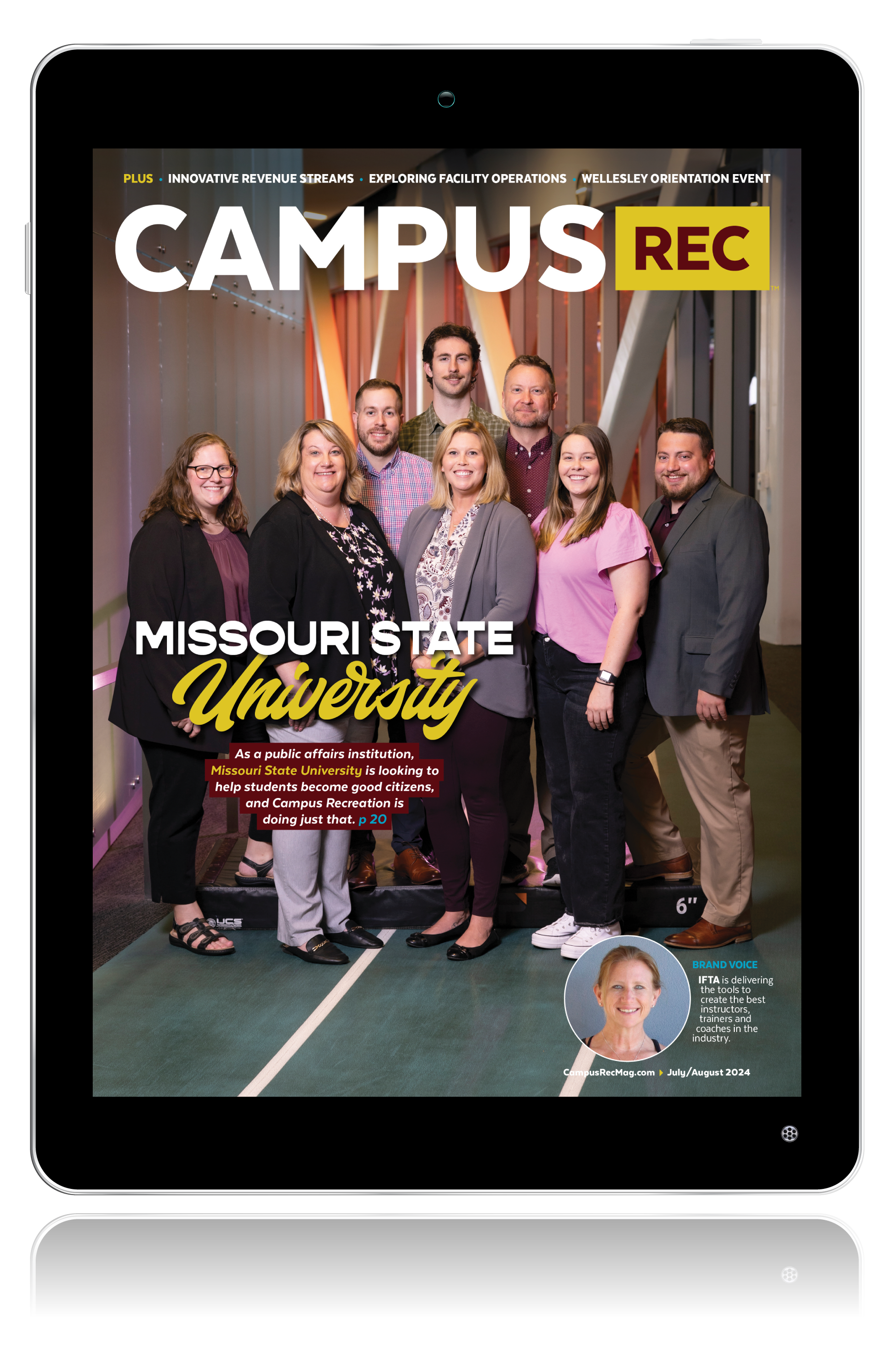Let me start this post with a disclaimer: I am making broad generalization of the Generation Z — I will use iGen in this post — the traditionally aged 18 to 24-year-old students we currently serve in campus recreation programs. This is my opinion formulated on research from Jean M. Twenge’s book, “iGen.”
In 2013 the first students from iGen entered college. These students, born after 1995, represent the first group of college attendees who experienced a life totally immersed in the internet age, and who entered adolescence with a smartphone in their hands.
Jean Twenge, a noted psychologist from San Diego State University, conducted research with data from roughly 11 million iGen members identifying a group engrossed in technology, risk adverse, and lacking social skills Millennial and Generation X members developed throughout their youth. Many have never held a job. Most haven’t dealt with any of their own problems thanks to helicopter parents. And many missed out on the transformational experience’s recreation administrators had during their teenage years.
The biggest question we as recreational professionals face is how to adapt to this group who does not share the characteristics held so dear by previous generations.
New Territory
I intentionally started this section with a section-heading pun as we at East Carolina University (ECU) noticed a changing demographic in 2018 with participation in our traditional Adventure trip offerings steadily declining. Students were no longer motivated to give up a whole weekend to experience the wilderness, completed with a five-hour van ride and $75-plus for trip fees. A weekend backpacking/camping trip previously filled four weeks in advance, but now we were struggling to reach trip minimums at 50% capacity.
Our student staff — an adventurous group — could not comprehend the participation drop and chalked it up to either poor marketing or general apathy from their peers. Our professional staff saw something different. We noticed a trend in participation across the board within recreational programming. Students were not committing to longer events. They wanted quick “experiences” they could post on Instagram or their Snapchat stories.
New Data
During the fall 2018 semester, we partnered with the ECU Student Affairs Assessment, Research and Planning Office to conduct focus groups for the adventure leadership trip program. We offered participation incentives, free food and kept them short — 75 to 90 minutes.
Data gleaned from the focus groups indicated a new trend from our student body: they wanted shorter offerings with less travel and reduced costs.
EXTRA CREDIT: Prepare for Fall 2021 with these five assessment tips.
Additionally, students indicated they were willing to pay more money for impactful experiences. These include things like parasailing on the North Carolina coast or skydiving adventures. Although the data wasn’t surprising, we were able to clarify student preferences and alter future operations. Putting assessment into practice is always challenging, but changes made with this data took our program in a new direction.
New ECU Adventure Trip Program Experiences
After our focus group debrief, the Adventure Leadership team completely revamped the trip calendar. A new emphasis is now on local experiences like:
- Ice skating
- Trampoline park
- Warrior Zone ninja training center
- Local axe throwing venue
Traditional adventure enthusiasts may scoff at the idea, but our student participants flocked instantly to the offerings. Trips filled within days and our total participations for the semester almost doubled. We continue to offer traditional camping, hiking, climbing and caving trips, but these “hardcore” outings are no longer our sole focus.
The diversification of the trip portfolio also led to another pleasant surprise: the visual diversity of our participants greatly improved. By changing our focus, we opened the world of adventure to a new segment of the university population traditionally underserved by our outdoor programs.
Three years later, our program participants are still diverse. Our staff has trended in a direction that reflects the demographic characteristics of the larger student population.
New Pricing
One of our most impactful changes to the ECU Adventure Trip Program was a free in-town series offered in Spring 2019. We removed the cost barrier to trips that only required our department to support student staff and minor transportation expenses.
Our Friday Float series previously offered at $10 per participant saw participation levels at less than 10 people. By removing the cost barrier, numbers ballooned to 30 registrants for each float.
Extra Credit: Generation Z has been negatively impacted by COVID-19. Ashley Demhski dives into how outdoor recreation could be the answer.
Additionally, our traditional specialty trips like skydiving are now a shuttle service. In fact, our department only passes along the registration cost to participants, removing all overhead fees. The high-price spring break trips of previous years are now more reasonable spring break experiences. These involve outings to the Florida Everglades, Disney World and Atlantic coast beaches.
Our department made the value-based decision that providing impactful experiences to our students was more important than remaining revenue-neutral or slightly profitable.
New Students
As we move forward, it is important to pay attention to your student demographic. Determining what your student population wants and needs, especially for adventure programming, is challenging even for the most seasoned professional.
When the fall 2021 semester opens, you are going to be trying to engage a group who has largely been away from campus for 18 months with almost half of them having never set foot on a college campus. Recreational professionals need to pay special attention to how these students want to interact. We need to focus on how they want to receive marketing and how they will participate.
The old ways of keeping the same intramural sports, adventure or fitness calendar left us in March 2021. The time is now to shift your focus to capturing an audience who might prove very difficult to get out of their resident hall room.
Image courtesy of Shutterstock










